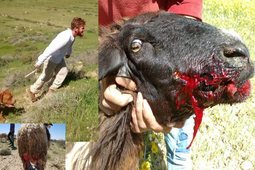20 mar 2018
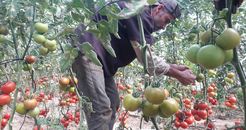
Amidst a state of shock, farmer Bandar Abu-Draz, 37, looks at his crop, which he cannot sell due to having large supplies compared to the limited demand and the low prices in the local market, causing heavy financial losses.
At his farm in the Khuza'a area, east of Khan Younis, Abu Draz looks with sorrow on ‘the cherry tomato’ crop, which he could not sell because of its low price standing at a half shekel per kilo.
The agricultural sector is at the risk of collapse due to the difficult economic conditions in the Gaza Strip and the huge daily financial losses of farmers.
A critical stage
As a result of the intensification of the Israeli siege on the Gaza Strip and the continued ban on exports from the Gaza Strip to the 1948 occupied territories (Israel), the agricultural sector is going through a very critical phase that could lead to its complete collapse in all sectors.
The decline of prices in local markets has become a source of frustration for farmers because of the economic collapse of the Gaza Strip as a result of the suffocating siege and the imposition of sanctions by the Palestinian Authority.
Abu-Draz points out that the agricultural sector in the Gaza Strip is on the verge of collapse and it started collapsing already.
Abu Draz suffered a lot of losses because of the lack of purchase, pointing out that there is no supporting body for this category, which has been chased by courts because of their inability to pay traders.
Leaving work
At his farm in the Khuza'a area, east of Khan Younis, Abu Draz looks with sorrow on ‘the cherry tomato’ crop, which he could not sell because of its low price standing at a half shekel per kilo.
The agricultural sector is at the risk of collapse due to the difficult economic conditions in the Gaza Strip and the huge daily financial losses of farmers.
A critical stage
As a result of the intensification of the Israeli siege on the Gaza Strip and the continued ban on exports from the Gaza Strip to the 1948 occupied territories (Israel), the agricultural sector is going through a very critical phase that could lead to its complete collapse in all sectors.
The decline of prices in local markets has become a source of frustration for farmers because of the economic collapse of the Gaza Strip as a result of the suffocating siege and the imposition of sanctions by the Palestinian Authority.
Abu-Draz points out that the agricultural sector in the Gaza Strip is on the verge of collapse and it started collapsing already.
Abu Draz suffered a lot of losses because of the lack of purchase, pointing out that there is no supporting body for this category, which has been chased by courts because of their inability to pay traders.
Leaving work
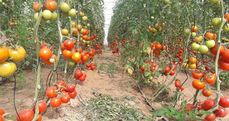
During the interview with Abu Draz, our correspondent was surprised that he gave tomato as food for animals, instead of delivering it to the European markets as it was supposed to be exported to those markets.
Abu Draz, who supports seven people and pays his brother’s fees abroad, says he is considering abandoning agricultural work because of the heavy losses he suffered as a result of the export ban and the low prices in the local markets.
The price of one kilo of tomato in the local markets is one shekel, which means that it is sold at half a shekel at the farm, which is a disaster at various levels, according to Abu Draz.
He explained that the Israeli ban on the entry of supplies used in agriculture, the high prices of pesticides and chemical fertilizer and banning the exports of agricultural products were the main causes behind the deterioration of the situation of farmers.
As for the livestock sector, the situation is not very different, especially in light of the farmers' inability to pay their debts because of the low prices of chicken and the low demand resulting from the difficult economic situation.
Farmer Tariq Abu Khater, one of the merchants who suffered heavy losses, is being chased by the police and security services due to unpaid bills owed to him due to financial losses.
Looking for solutions?
Abu Draz, who supports seven people and pays his brother’s fees abroad, says he is considering abandoning agricultural work because of the heavy losses he suffered as a result of the export ban and the low prices in the local markets.
The price of one kilo of tomato in the local markets is one shekel, which means that it is sold at half a shekel at the farm, which is a disaster at various levels, according to Abu Draz.
He explained that the Israeli ban on the entry of supplies used in agriculture, the high prices of pesticides and chemical fertilizer and banning the exports of agricultural products were the main causes behind the deterioration of the situation of farmers.
As for the livestock sector, the situation is not very different, especially in light of the farmers' inability to pay their debts because of the low prices of chicken and the low demand resulting from the difficult economic situation.
Farmer Tariq Abu Khater, one of the merchants who suffered heavy losses, is being chased by the police and security services due to unpaid bills owed to him due to financial losses.
Looking for solutions?
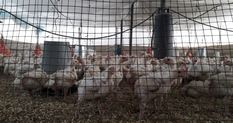
Abu Khater explained to the PIC correspondent that poultry farming is his only source of livelihood in light of the difficult economic conditions in the Gaza Strip, pointing out that he might lose his source of livelihood, putting his family of six at risk.
He said: “The chicken costs us about nine shekels, and its market price is nine shekels, which means selling it at 7.5 shekels in the poultry farm, which causes a loss to us of one and a half shekel per kilo.”
Abu Khater appealed to the Ministry of Agriculture and concerned parties to work to find a solution to their problem, calling for preventing the import of Israeli frozen chickens to allow local farmers supply their chickens to the market at reasonable prices.
Economic expert Mohammed Abu Jayyab pointed out that the agricultural sector is an important part of the Palestinian economy, and an inseparable part of the difficult reality that Gaza suffers from due to the ongoing Israeli violations.
In an interview with the PIC, Abu Jayyab pointed to the seriousness of the Palestinian Authority’s lack of support to the agricultural sector, which is limited to NGOs and unions that exert every effort possible to help the farmers.
He called for the need to amend the approach adopted at the legal, procedural and implementation levels by the Palestinian Authority and the competent authorities to preserve the remaining agricultural land.
Officials and economic experts warned of the danger of Israeli violations against the agricultural sector in the Gaza Strip, and their negative impact on the lives of citizens and consumers, as well as the agricultural land itself.
The Director of Operations and Development at the Union of Agricultural Work Committees, Bashir Al-Anqa, said during a seminar days ago that the weak purchasing power of the local consumer as a result of poor economic conditions led to a sharp decline in prices, which affected the income of farmers and inflicted heavy losses on this important sector.
He said: “The chicken costs us about nine shekels, and its market price is nine shekels, which means selling it at 7.5 shekels in the poultry farm, which causes a loss to us of one and a half shekel per kilo.”
Abu Khater appealed to the Ministry of Agriculture and concerned parties to work to find a solution to their problem, calling for preventing the import of Israeli frozen chickens to allow local farmers supply their chickens to the market at reasonable prices.
Economic expert Mohammed Abu Jayyab pointed out that the agricultural sector is an important part of the Palestinian economy, and an inseparable part of the difficult reality that Gaza suffers from due to the ongoing Israeli violations.
In an interview with the PIC, Abu Jayyab pointed to the seriousness of the Palestinian Authority’s lack of support to the agricultural sector, which is limited to NGOs and unions that exert every effort possible to help the farmers.
He called for the need to amend the approach adopted at the legal, procedural and implementation levels by the Palestinian Authority and the competent authorities to preserve the remaining agricultural land.
Officials and economic experts warned of the danger of Israeli violations against the agricultural sector in the Gaza Strip, and their negative impact on the lives of citizens and consumers, as well as the agricultural land itself.
The Director of Operations and Development at the Union of Agricultural Work Committees, Bashir Al-Anqa, said during a seminar days ago that the weak purchasing power of the local consumer as a result of poor economic conditions led to a sharp decline in prices, which affected the income of farmers and inflicted heavy losses on this important sector.
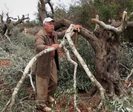
Several extremist Israel colonizers invaded, earlier Tuesday, a Palestinian olive orchard in the al-Jab’a village, southwest of Bethlehem, cut at least thirty olive trees, and took them away.
Hasan Breijiyya, the coordinator of the Popular Committee against the Annexation Wall and Colonies, said the Israeli assailants came from Bayt ‘Ayin illegal colonialist outpost, which was built in private Palestinian lands.
He added that the colonizers cut thirty olive trees from an orchard in Wad Abu Zalta area, in the eastern part of the village, and took the trees with them.
Breijiyya stated that the trees are owned by a local farmer, identified as Mohammad Ali Hamdan, and added that the area has been subject to constant violations, including cutting and uprooting trees, and bulldozing Palestinian lands.
Hasan Breijiyya, the coordinator of the Popular Committee against the Annexation Wall and Colonies, said the Israeli assailants came from Bayt ‘Ayin illegal colonialist outpost, which was built in private Palestinian lands.
He added that the colonizers cut thirty olive trees from an orchard in Wad Abu Zalta area, in the eastern part of the village, and took the trees with them.
Breijiyya stated that the trees are owned by a local farmer, identified as Mohammad Ali Hamdan, and added that the area has been subject to constant violations, including cutting and uprooting trees, and bulldozing Palestinian lands.
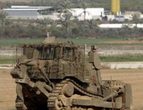
Israeli soldiers fired, on Tuesday morning, many live rounds at Palestinian farmers, east of Khan Younis, in the southern part of the Gaza Strip, and invaded farmlands in the area, in addition Beit Hanoun, to the northern part of the coastal region.
Eyewitnesses said the soldiers, driving an armored military jeep across the border fence, exited their vehicles, and fired many live rounds at the farmers, in the Sanati and al-Qarara areas, east of Khan Younis, forcing the Palestinians to leave their lands in fear of further escalation.
Furthermore, several armored vehicles, including bulldozers, invaded lands, east of Beit Hanoun, in northern Gaza, and bulldozed areas close to the fence, while military drones hovered overhead.
Eyewitnesses said the soldiers, driving an armored military jeep across the border fence, exited their vehicles, and fired many live rounds at the farmers, in the Sanati and al-Qarara areas, east of Khan Younis, forcing the Palestinians to leave their lands in fear of further escalation.
Furthermore, several armored vehicles, including bulldozers, invaded lands, east of Beit Hanoun, in northern Gaza, and bulldozed areas close to the fence, while military drones hovered overhead.
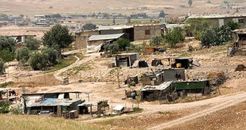
The Israeli occupation army on Monday continued to carry out military drills in the mountainous area of al-Aqaba village in the northern Jordan Valley, destroying cultivated fields belonging to Palestinian farmers.
Chief of the village Sami Sadeq reported that the local farmers incurred more heavy losses after Israeli armored vehicles wreaked havoc on their agricultural lands.
He added that the Israeli army had been conducting drills for days in their area and its troops deliberately caused widespread damage to rain-fed crops.
Chief of the village Sami Sadeq reported that the local farmers incurred more heavy losses after Israeli armored vehicles wreaked havoc on their agricultural lands.
He added that the Israeli army had been conducting drills for days in their area and its troops deliberately caused widespread damage to rain-fed crops.
19 mar 2018
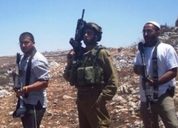
Extremist Israeli settlers, on Monday, attacked Palestinian farmers in the town of Turmus Ayya, northeast of Ramallah, and forced them off of their land, local sources said, according to WAFA.
Saeed Taleb, Turmus Ayya municipal council member, said that settlers from the illegal Israeli settlement of Adi Ad, which was built on Turmus Ayya land, attacked about 10 Palestinian farmers while they were tending to their lands, throwing rocks at them as soldiers present in the area watched without intervening.
When the farmers attempted to ward off the settlers, the soldiers intervened to protect the settlers and forced the farmers to leave their lands, despite their possession of Israeli-army issued permits to access and work in their lands.
Saeed Taleb, Turmus Ayya municipal council member, said that settlers from the illegal Israeli settlement of Adi Ad, which was built on Turmus Ayya land, attacked about 10 Palestinian farmers while they were tending to their lands, throwing rocks at them as soldiers present in the area watched without intervening.
When the farmers attempted to ward off the settlers, the soldiers intervened to protect the settlers and forced the farmers to leave their lands, despite their possession of Israeli-army issued permits to access and work in their lands.

An awful scene of a two-thousand-square-meter factory filled with dust, its fabric machinery destroyed and covered by rust, as dust and dirt fill the place at which workers have stopped working for more than ten years.
In the area of Beit Anoun, east of al-Khalil, light has been missing from the “Al-Khalil Clothing Factory for Women and Men” (owned by Haji Hashim Natsheh, a senior businessman and the former head of the Chamber of Commerce and Industry in the city).
Unjust agreements
Haj Hashem al-Natsheh attributed work stoppage at the factory to the economic and political agreements that destroyed the national economy. He pointed out that the Paris Economic Agreements have unleashed uncontrolled imports, while the Palestinian Authority failed to protect national products.
“We were left alone to face the imported products without any support. Whatever our economic strength is, we cannot compete with Chinese products, despite the good quality of our products in comparison,” Al-Natshe said in an exclusive interview with the PIC.
“Merchants in the West Bank, especially al-Khalil, have become importers, as markets became full of cheap Chinese clothes,” he says. “The cost of making a pajama for men was $5, and we used to sell it for $7. Today, it is imported from China for $2! This destroyed our production and caused the closure of hundreds of clothing factories.”
Absence of national protection
The fate of Al-Qawasmi National Factory for Socks in al-Khalil was not better than its predecessors. Some 130 workers had their jobs terminated and the factory was closed down after its collapse. “The lack of a PA’s role in protecting national products destroyed local industries.”
He pointed out that the PA is encouraging imports rather than exports, in order to raise more taxes and win the ‘royalties’ of a number of influential people, at the expense of national factories and products that were completely destroyed.
Al-Qawasmi told the PIC reporter with sorrow in his eyes, “With the closure of our factory, 130 families were deprived of their monthly income at a time of growing unemployment, as our losses exceeded three million dollars, and we ended up with no money whatsoever, due to unwise policies that do not keep in mind the interests of our country.”
Limitations imposed by international institutions
“The economic agreements have besieged the Palestinian national industry and tightened the screws on it, while importers have been unleashed and protected,” said Saeed Abdullah, an economic analyst and the Director of the Economic Policy Department at MAS. “This has led to a significant decline in national industries and the inability to protect them.”
“The PA cannot protect national products by imposing taxes on imported goods, because it violates World Trade Organization’s and the World Bank’s policies. The conditions for accession to these organizations require compliance with their signed protocols, meaning removing barriers and restrictions on international trade and this is globalization,” he concluded.
In the area of Beit Anoun, east of al-Khalil, light has been missing from the “Al-Khalil Clothing Factory for Women and Men” (owned by Haji Hashim Natsheh, a senior businessman and the former head of the Chamber of Commerce and Industry in the city).
Unjust agreements
Haj Hashem al-Natsheh attributed work stoppage at the factory to the economic and political agreements that destroyed the national economy. He pointed out that the Paris Economic Agreements have unleashed uncontrolled imports, while the Palestinian Authority failed to protect national products.
“We were left alone to face the imported products without any support. Whatever our economic strength is, we cannot compete with Chinese products, despite the good quality of our products in comparison,” Al-Natshe said in an exclusive interview with the PIC.
“Merchants in the West Bank, especially al-Khalil, have become importers, as markets became full of cheap Chinese clothes,” he says. “The cost of making a pajama for men was $5, and we used to sell it for $7. Today, it is imported from China for $2! This destroyed our production and caused the closure of hundreds of clothing factories.”
Absence of national protection
The fate of Al-Qawasmi National Factory for Socks in al-Khalil was not better than its predecessors. Some 130 workers had their jobs terminated and the factory was closed down after its collapse. “The lack of a PA’s role in protecting national products destroyed local industries.”
He pointed out that the PA is encouraging imports rather than exports, in order to raise more taxes and win the ‘royalties’ of a number of influential people, at the expense of national factories and products that were completely destroyed.
Al-Qawasmi told the PIC reporter with sorrow in his eyes, “With the closure of our factory, 130 families were deprived of their monthly income at a time of growing unemployment, as our losses exceeded three million dollars, and we ended up with no money whatsoever, due to unwise policies that do not keep in mind the interests of our country.”
Limitations imposed by international institutions
“The economic agreements have besieged the Palestinian national industry and tightened the screws on it, while importers have been unleashed and protected,” said Saeed Abdullah, an economic analyst and the Director of the Economic Policy Department at MAS. “This has led to a significant decline in national industries and the inability to protect them.”
“The PA cannot protect national products by imposing taxes on imported goods, because it violates World Trade Organization’s and the World Bank’s policies. The conditions for accession to these organizations require compliance with their signed protocols, meaning removing barriers and restrictions on international trade and this is globalization,” he concluded.
17 mar 2018

United Nations Office for the Coordination of Humanitarian Affairs (OCHA) said that the longstanding Israeli siege on Gaza Strip has led to deteriorated living conditions of approximately two million Palestinians in the blockaded coastal enclave.
OCHA stated, in a report on Friday, that 72% of Palestinians in Gaza lack food security, while 40% of the residents are living below poverty line. The report added that the unemployment rate has exceeded 60% and about 80% of the inhabitants receive international aid in one way or another.
The restrictions on the movement of the Gazan people continue to reduce access to livelihoods, essential services and housing, disrupt family life, and undermine people’s hopes for a secure and prosperous future.
The situation has been compounded by the restrictions imposed since June 2013 by the Egyptian authorities at Rafah Crossing, which had become the main crossing point used by Palestinian passengers in the Gaza Strip and had rarely been opened over the past two years.
OCHA stated, in a report on Friday, that 72% of Palestinians in Gaza lack food security, while 40% of the residents are living below poverty line. The report added that the unemployment rate has exceeded 60% and about 80% of the inhabitants receive international aid in one way or another.
The restrictions on the movement of the Gazan people continue to reduce access to livelihoods, essential services and housing, disrupt family life, and undermine people’s hopes for a secure and prosperous future.
The situation has been compounded by the restrictions imposed since June 2013 by the Egyptian authorities at Rafah Crossing, which had become the main crossing point used by Palestinian passengers in the Gaza Strip and had rarely been opened over the past two years.
15 mar 2018
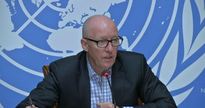
Jamie McGoldrick, of the UN Office for the Coordination of Humanitarian Affairs (OCHA), announced on Wednesday the launch of the Humanitarian Response Plan (HRP) for 2018, which aims to support the needs of 1.9 million Palestinians in the occupied Palestinian territory, or oPt.
McGoldrick said the plan exists in the context of one of the world’s most long-standing protection crises, which remains directly tied to the impact of Israel’s occupation, which marked its 50th year in June 2017, alongside internal Palestinian divisions and Egypt’s closure of Rafah crossing.
“This year, we are especially pleased to co-launch the appeal in Gaza with the State of Palestine. In so doing, we are sending a strong message of our joint commitment to improving the humanitarian situation for Gaza’s nearly 2 million Palestinian residents, over half of them children”, he said.
“There is no place more fitting to launch the humanitarian plan than Gaza, where we see a man-made tragedy unfolding daily. Today, Gaza is on the brink of catastrophe and humanitarian needs run deep. Ten (10) years of intensified movement and access restrictions, recurrent escalations of hostilities, alongside internal Palestinian divisions and closure of Rafah, have left 70 per cent of the population reliant on international aid”, he added.
“Some 40 per cent of Gaza’s households fail to meet international standards for food security; unemployment stands at nearly 47 per cent, due largely to a crippled economy, limited by restrictions on movement of people and goods, and an energy crisis that leaves people without electricity up to 20 hours a day,” McGoldrick warned.
“Without donor-funded emergency fuel distributed to critical water, sanitation and health facilities, we would face a total systems collapse, with the result, a humanitarian disaster. Even with support, 40 per cent of the population receives just 4 to 6 hours of water supply, every 3 to 5 days, and over 100 million liters of sewage – nearly all of it raw –flows into the sea each day. Access to healthcare, a basic human right, is denied to thousands, due to a lack of drugs, equipment and expertise available in Gaza, compounded by significant difficulty to exit the Strip to receive treatment elsewhere.”
“In front of us, we see the damage left from the 2014 escalation of hostilities. Great strides have been made in the reconstruction effort, but over 20,000 Palestinians remain displaced from that period. Less visible is the psychological damage, particularly on children, sustained by hundreds of thousands of Palestinians during the conflict, and those that preceded it,” OCHA maintained.
“To the right, we see the signs of the crisis in basic services that has worsened over the last year, with an estimated 30,000 tons of uncollected trash gathering at this site alone;
Behind me, we see the Beit Lahiya sewage lagoons; a symbol of the insufficient water and sanitation infrastructure, dependent on donor-funded fuel to pump out the sewage or risk an overflow of the lagoon, like the one that claimed the lives of 5 Palestinians in 2007,” OCHA’s statement read. “And, finally, to the left, we see the access restricted areas on land, where farmers face restrictions imposed by the Israeli authorities on their ability to access their agricultural land, posing physical safety risks and impacting livelihoods across Gaza. These areas are among those with the highest vulnerability in the oPt, a reality exemplified earlier this month, when a 59-year-old Palestinian farmer was killed by Israeli gunfire while working on his farm in the restricted areas, east of Khan Younis.”
According to McGoldrick, in the West Bank, the volume of needs are less, but no less serious or urgent. Movement and access restrictions, often in the context of Israeli settlement activity, and discriminatory planning and zoning policies, have fragmented the territory, resulting in destroyed homes and livelihoods. The combined impact of a number of policies has created for many Palestinians, in areas like Area C, East Jerusalem and the Israeli-controlled part of al-Khalil city, a coercive environment that pressures them to leave and generates a risk of forcible transfer.
“Some 270,000 Palestinians in Area C are directly affected by Israeli restrictions and control over water and sanitation infrastructure”, he said. “350,000 people in the West Bank are vulnerable to settler violence and over 260,000 people, including Palestine refugees, are in need of humanitarian healthcare. Access to education is heavily compromised by an increase in education-related violations, affecting almost 40,000 students and teachers.”
“Against this worrying backdrop of needs in the oPt, the massive funding crisis faced by UNRWA, one of the main service providers and a main employer, particularly in Gaza, should be of concern to everyone, not just Palestine refugees”, he stressed.
Overall, the 2018 humanitarian plan appeals for US$ 539.7 million to address urgent humanitarian needs in the areas of protection, food security, health, water and sanitation, shelter and education. Of the request, 75 per cent targets Palestinians in Gaza. Half of the overall amount is for UNRWA emergency projects.
McGoldrick said the plan exists in the context of one of the world’s most long-standing protection crises, which remains directly tied to the impact of Israel’s occupation, which marked its 50th year in June 2017, alongside internal Palestinian divisions and Egypt’s closure of Rafah crossing.
“This year, we are especially pleased to co-launch the appeal in Gaza with the State of Palestine. In so doing, we are sending a strong message of our joint commitment to improving the humanitarian situation for Gaza’s nearly 2 million Palestinian residents, over half of them children”, he said.
“There is no place more fitting to launch the humanitarian plan than Gaza, where we see a man-made tragedy unfolding daily. Today, Gaza is on the brink of catastrophe and humanitarian needs run deep. Ten (10) years of intensified movement and access restrictions, recurrent escalations of hostilities, alongside internal Palestinian divisions and closure of Rafah, have left 70 per cent of the population reliant on international aid”, he added.
“Some 40 per cent of Gaza’s households fail to meet international standards for food security; unemployment stands at nearly 47 per cent, due largely to a crippled economy, limited by restrictions on movement of people and goods, and an energy crisis that leaves people without electricity up to 20 hours a day,” McGoldrick warned.
“Without donor-funded emergency fuel distributed to critical water, sanitation and health facilities, we would face a total systems collapse, with the result, a humanitarian disaster. Even with support, 40 per cent of the population receives just 4 to 6 hours of water supply, every 3 to 5 days, and over 100 million liters of sewage – nearly all of it raw –flows into the sea each day. Access to healthcare, a basic human right, is denied to thousands, due to a lack of drugs, equipment and expertise available in Gaza, compounded by significant difficulty to exit the Strip to receive treatment elsewhere.”
“In front of us, we see the damage left from the 2014 escalation of hostilities. Great strides have been made in the reconstruction effort, but over 20,000 Palestinians remain displaced from that period. Less visible is the psychological damage, particularly on children, sustained by hundreds of thousands of Palestinians during the conflict, and those that preceded it,” OCHA maintained.
“To the right, we see the signs of the crisis in basic services that has worsened over the last year, with an estimated 30,000 tons of uncollected trash gathering at this site alone;
Behind me, we see the Beit Lahiya sewage lagoons; a symbol of the insufficient water and sanitation infrastructure, dependent on donor-funded fuel to pump out the sewage or risk an overflow of the lagoon, like the one that claimed the lives of 5 Palestinians in 2007,” OCHA’s statement read. “And, finally, to the left, we see the access restricted areas on land, where farmers face restrictions imposed by the Israeli authorities on their ability to access their agricultural land, posing physical safety risks and impacting livelihoods across Gaza. These areas are among those with the highest vulnerability in the oPt, a reality exemplified earlier this month, when a 59-year-old Palestinian farmer was killed by Israeli gunfire while working on his farm in the restricted areas, east of Khan Younis.”
According to McGoldrick, in the West Bank, the volume of needs are less, but no less serious or urgent. Movement and access restrictions, often in the context of Israeli settlement activity, and discriminatory planning and zoning policies, have fragmented the territory, resulting in destroyed homes and livelihoods. The combined impact of a number of policies has created for many Palestinians, in areas like Area C, East Jerusalem and the Israeli-controlled part of al-Khalil city, a coercive environment that pressures them to leave and generates a risk of forcible transfer.
“Some 270,000 Palestinians in Area C are directly affected by Israeli restrictions and control over water and sanitation infrastructure”, he said. “350,000 people in the West Bank are vulnerable to settler violence and over 260,000 people, including Palestine refugees, are in need of humanitarian healthcare. Access to education is heavily compromised by an increase in education-related violations, affecting almost 40,000 students and teachers.”
“Against this worrying backdrop of needs in the oPt, the massive funding crisis faced by UNRWA, one of the main service providers and a main employer, particularly in Gaza, should be of concern to everyone, not just Palestine refugees”, he stressed.
Overall, the 2018 humanitarian plan appeals for US$ 539.7 million to address urgent humanitarian needs in the areas of protection, food security, health, water and sanitation, shelter and education. Of the request, 75 per cent targets Palestinians in Gaza. Half of the overall amount is for UNRWA emergency projects.
14 mar 2018

The Israeli army invaded, Wednesday, Nahhalin town, west of Bethlehem in the occupied West Bank, and handed military orders halting the construction of five Palestinian homes.
Hannoun Fannoun, a member of Nahhalin Town Council, said the five homes ae located in Sabeeha al-Foqa and Wad an-No’man areas, and added that the military claims the properties were not licensed by the Israeli Civil Administration office, in the occupied West Bank.
The properties are owned by Hisham Ahmad Najajra, Saher Adnan Najajra, Ahmad Yousef Najajra, Fares Mohammad Najajra and Ma’moun Issa Fannoun.
Fannoun added that the town has been subject to serious Israeli violations and escalation, including the illegal confiscation of privately-owned lands, demolitions of homes and property, and orders to halt constructions, in addition to ongoing invasions, violent searches of homes and abductions.
The official also said that Israel is preventing the Palestinians from building on their own lands, and is illegally confiscating and isolating their lands by surrounding them with the illegal Annexation Wall and colonies.
In related news, the army issued orders for uprooting grapevines and olive trees in Khallet Thaher al-Ein area, in al-Khader town, south of Bethlehem, to pave a new road for colonialist settlers.
The order refers to large areas of the Palestinians land which were illegally confiscated by the Israeli military months earlier.
Hannoun Fannoun, a member of Nahhalin Town Council, said the five homes ae located in Sabeeha al-Foqa and Wad an-No’man areas, and added that the military claims the properties were not licensed by the Israeli Civil Administration office, in the occupied West Bank.
The properties are owned by Hisham Ahmad Najajra, Saher Adnan Najajra, Ahmad Yousef Najajra, Fares Mohammad Najajra and Ma’moun Issa Fannoun.
Fannoun added that the town has been subject to serious Israeli violations and escalation, including the illegal confiscation of privately-owned lands, demolitions of homes and property, and orders to halt constructions, in addition to ongoing invasions, violent searches of homes and abductions.
The official also said that Israel is preventing the Palestinians from building on their own lands, and is illegally confiscating and isolating their lands by surrounding them with the illegal Annexation Wall and colonies.
In related news, the army issued orders for uprooting grapevines and olive trees in Khallet Thaher al-Ein area, in al-Khader town, south of Bethlehem, to pave a new road for colonialist settlers.
The order refers to large areas of the Palestinians land which were illegally confiscated by the Israeli military months earlier.
13 mar 2018
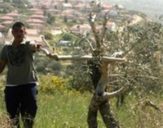
Israeli colonizers attacked, Tuesday, a Palestinian farmer while plowing his land in Burin village, southwest of the northern West Bank city of Nablus.
The assailants came from Yitzhar adjacent illegal colony, which was built on illegally-confiscated Palestinian lands.
They hurled stones at Mohammad Hasan Najjar, inflicting various cuts and bruises, in addition to causing damage to his tractor.
Furthermore, Israeli colonizers from Elon Moreh illegal outpost, invaded nearby Palestinian orchards in Deir al-Hatab village, east of Nablus, and cut many olive trees.
In related news, a group of extremist Israeli colonizers invaded, earlier on Monday morning, Palestinian agricultural lands in Masafer Yatta area, south of Hebron city, in the southern part of the occupied West Bank, and burnt nearly 30 Dunams.
The assailants came from Yitzhar adjacent illegal colony, which was built on illegally-confiscated Palestinian lands.
They hurled stones at Mohammad Hasan Najjar, inflicting various cuts and bruises, in addition to causing damage to his tractor.
Furthermore, Israeli colonizers from Elon Moreh illegal outpost, invaded nearby Palestinian orchards in Deir al-Hatab village, east of Nablus, and cut many olive trees.
In related news, a group of extremist Israeli colonizers invaded, earlier on Monday morning, Palestinian agricultural lands in Masafer Yatta area, south of Hebron city, in the southern part of the occupied West Bank, and burnt nearly 30 Dunams.
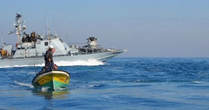
Israeli navy ships opened fire, on Tuesday morning, at several Palestinian fishing boats, and used sprayed them with water cannons, in the northern part of the Gaza Strip.
Eyewitnesses said the boats were in Palestinian territorial waters, in northern Gaza, when the navy attacked them.
The navy opened fire at the fishing boats, before attacking them with water cannons.
In related news, Israel released Ahmad Ziad al-Bardaweel, 15, who was abducted by the navy, Monday, near Rafah, in the southern part of the Gaza Strip.
Eyewitnesses said the boats were in Palestinian territorial waters, in northern Gaza, when the navy attacked them.
The navy opened fire at the fishing boats, before attacking them with water cannons.
In related news, Israel released Ahmad Ziad al-Bardaweel, 15, who was abducted by the navy, Monday, near Rafah, in the southern part of the Gaza Strip.
12 mar 2018
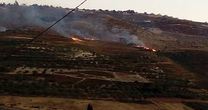
Israeli settlers on Monday burned down 30 dunums of cultivated Palestinian land lots in al-Khalil’s southern town of Yatta.
Coordinator for the popular anti-settlement committee south of al-Khalil, Rateb Jabour, said Israelis residing in Ma’on illegal settlement outpost set fire to Palestinian crops in the nearby Khilet al-Adra area.
The destroyed crops reportedly belong to the Shawaheen family and are annually used by local Palestinian farmers and shepherds to feed their livestock during winter season.
Meanwhile, Israeli occupation forces photographed Palestinian homes and tents in Sosiya, in Yatta.
Coordinator for the popular anti-settlement committee south of al-Khalil, Rateb Jabour, said Israelis residing in Ma’on illegal settlement outpost set fire to Palestinian crops in the nearby Khilet al-Adra area.
The destroyed crops reportedly belong to the Shawaheen family and are annually used by local Palestinian farmers and shepherds to feed their livestock during winter season.
Meanwhile, Israeli occupation forces photographed Palestinian homes and tents in Sosiya, in Yatta.
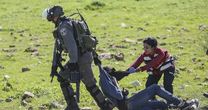
Israeli settlers on Monday attacked a number of Palestinian farmers while they were tending to their agricultural land in Hawara town, south of Nablus, to the north of occupied West Bank.
Local activist Ghassan Daghles said that the settlers from Yitzhar settlement, built illegally on Palestinian-private lands, attacked the farmers while they were ploughing their land north of the town.
The settlers also attempted to destroy the farmers’ agricultural trucks, he added.
Settlers routinely attack Palestinians and their property to intimidate local communities to leave their land.
Israeli occupation soldiers are often present during attacks and rarely intervene to protect Palestinians from settler violence.
Local activist Ghassan Daghles said that the settlers from Yitzhar settlement, built illegally on Palestinian-private lands, attacked the farmers while they were ploughing their land north of the town.
The settlers also attempted to destroy the farmers’ agricultural trucks, he added.
Settlers routinely attack Palestinians and their property to intimidate local communities to leave their land.
Israeli occupation soldiers are often present during attacks and rarely intervene to protect Palestinians from settler violence.
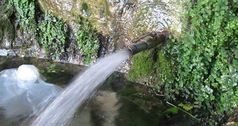
Palestinian farmers from Salfit province have raised alarm bells over the repercussions of Israel’s settlement activity and settler break-ins into Salfit’s natural sites and reserves.
Researcher Khaled Maali said Israeli settlers have been ransacking natural sites in Salfit, among other areas in the occupied West Bank, and placing Hebrew-speaking banners to mislead visitors about the history of the sites.
Israeli settlers have also been swimming in Salfit’s spring waters, of which they claim ownership, and attending lectures on their alleged Israeli history.
Maali and the Palestinian locals stressed the need to rehabilitate such natural sites, particularly water springs and resources located near Israeli settlement outposts and in the Israeli-occupied Area C, and to intensify the presence of Palestinian students and visitors in the area so as to protect such a resourceful natural legacy and enlarge the younger generations’ knowledge about their natural heritage.
Researcher Khaled Maali said Israeli settlers have been ransacking natural sites in Salfit, among other areas in the occupied West Bank, and placing Hebrew-speaking banners to mislead visitors about the history of the sites.
Israeli settlers have also been swimming in Salfit’s spring waters, of which they claim ownership, and attending lectures on their alleged Israeli history.
Maali and the Palestinian locals stressed the need to rehabilitate such natural sites, particularly water springs and resources located near Israeli settlement outposts and in the Israeli-occupied Area C, and to intensify the presence of Palestinian students and visitors in the area so as to protect such a resourceful natural legacy and enlarge the younger generations’ knowledge about their natural heritage.
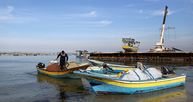
Israeli navy ships attacked, on Monday morning, many Palestinian fishing boats near the shore of Rafah, in the southern part of the besieged Gaza Strip, abducted eleven fishermen and confiscated their boats.
Fishermen who witnessed the Israeli assault said the navy fired dozens of live rounds at the fishing boats, while sailing less than four nautical miles from the Rafah shore.
They added that the navy abducted eleven fishermen after forcing them to undress and swim towards the navy ships, before moving them to Ashdod port, along with three confiscated boats.
The abducted fishermen have been identified as Mohammad ‘Adel Miqdad, Ibrahim ‘Adel Miqdad, ‘Ala Ibrahim Miqdad, Mohammad No’man Miqdad, Mohammad Ibrahim Miqdad, Adel Ibrahim Miqdad, Ahmad Shaker Miqdad, Ahmad Ziad Bardaweel, Mohammad Farahat ‘Ashour, Amin Sa’adi Jom’a, Ahmad Ziad Bardaweel and Ahmad Mohammad Tababsha.
Israeli navy detain ten fishermen off Gaza shores
Israeli naval forces on Monday morning detained ten Palestinian fishermen while sailing off the coast of Rafah, to the south of Gaza.
Speaking to the PIC reporter, Palestinian fishermen Captain Nizar Ayyash pointed out that the incident is the first of its kind that occurred in southern Gaza since the beginning of the year.
Israeli navy targets Palestinian fishermen and their boats almost on a daily basis.
According to the Palestinian Center for Human Rights (PCHR), all Israeli attacks on Palestinian fishermen have taken place within the distance of six nautical miles, which it said “proves that Israeli forces' policies aim to tighten restrictions on the Gaza Strip's fishermen and their livelihoods.”
Fishermen who witnessed the Israeli assault said the navy fired dozens of live rounds at the fishing boats, while sailing less than four nautical miles from the Rafah shore.
They added that the navy abducted eleven fishermen after forcing them to undress and swim towards the navy ships, before moving them to Ashdod port, along with three confiscated boats.
The abducted fishermen have been identified as Mohammad ‘Adel Miqdad, Ibrahim ‘Adel Miqdad, ‘Ala Ibrahim Miqdad, Mohammad No’man Miqdad, Mohammad Ibrahim Miqdad, Adel Ibrahim Miqdad, Ahmad Shaker Miqdad, Ahmad Ziad Bardaweel, Mohammad Farahat ‘Ashour, Amin Sa’adi Jom’a, Ahmad Ziad Bardaweel and Ahmad Mohammad Tababsha.
Israeli navy detain ten fishermen off Gaza shores
Israeli naval forces on Monday morning detained ten Palestinian fishermen while sailing off the coast of Rafah, to the south of Gaza.
Speaking to the PIC reporter, Palestinian fishermen Captain Nizar Ayyash pointed out that the incident is the first of its kind that occurred in southern Gaza since the beginning of the year.
Israeli navy targets Palestinian fishermen and their boats almost on a daily basis.
According to the Palestinian Center for Human Rights (PCHR), all Israeli attacks on Palestinian fishermen have taken place within the distance of six nautical miles, which it said “proves that Israeli forces' policies aim to tighten restrictions on the Gaza Strip's fishermen and their livelihoods.”
